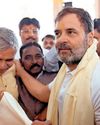
THE RESULTS OF THE 2024
National Eligibility-cum-Entrance Test for undergraduates (NEET UG), which were announced on June 4, seem to be raising more questions than answers with each passing day.
The alleged discrepancies in the results, and the subsequent countrywide protests, have snowballed into Modi 3.0's first full-fledged controversy. Within a week, the Union government changed its stance from "all is well" with the National Testing Agency, the premier body at the centre of the controversy, to "a lot of improvement is required in the NTA"
The government has been under pressure from raging protests, allegations of paper leaks, NEET-related arrests in states and opposition attacks. The Supreme Court is also seeking answers from the NTA, saying the "sanctity of the exam had been affected"
Union Education Minister Dharmendra Pradhan, one of the few in the new cabinet who have retained their ministerial portfolios in the past cabinet, is having a tough time defending the NTA. Established in 2017, the NTA conducts a range of national-level exams for admission to engineering, medicine, management, pharmacy and other higher education courses. Experts say that ever since the NTA became operational in September 2018, instances of mismanagement, technical errors and allegations of irregularities have been on the rise.
"Last year, the demand to re-conduct JEE (joint entrance exam) trended on social media, but nothing happened. In 2017, there was a major leak in SSC (Staff Selection Commission) exams. This year, the cutoff for NEET UG has gone up abruptly, indicating anomalies. The situation has worsened in the past few years," said Keshav Aggarwal, president, the NGO Educators Society.
This story is from the {{IssueName}} edition of {{MagazineName}}.
Start your 7-day Magzter GOLD free trial to access thousands of curated premium stories, and 9,000+ magazines and newspapers.
Already a subscriber ? Sign In
This story is from the {{IssueName}} edition of {{MagazineName}}.
Start your 7-day Magzter GOLD free trial to access thousands of curated premium stories, and 9,000+ magazines and newspapers.
Already a subscriber? Sign In

Use multi-asset investing to overcome portfolio volatility
EQUITY MARKETS have been choppy during this year. After rallying for the better part of the first nine months of 2024, equities corrected sharply in October and November, before taking off once again on rally mode in December.

Twist of faith
Upamanyu Chatterjee is back with his wry sense of humour in his new novel, and most of it is directed at religion and spirituality

THE GLORY OF SARI
Saris of Memory weaves together history and textiles, highlighting key moments from the author's collection

We win together
We invented chess, which was pretty cool of us. The original game 'chaturanga'that is four divisions (infantry, cavalry, elephantry and chariotry)-was a war strategy game. When the game travelled to the Middle East, they mangled the Sanskrit and it ended up being called 'shatranj' instead.

BEATS THAT HEAL
Music ignites the light within us, says Grammy-winner Chandrika Tandon

Older, smarter, sexier
Those who worship him regardless of where he works have continued to do so. Such is the power of Alessandro Michele, that after being the face of some mega brands for 10 years (namely Gucci and now Valentino), he remains bigger than the labels themselves. His debut collection for Valentino was presented at the recent Paris Haute Couture Week, and it has been adored by his adorers.

The road to peace
Future political dialogues should explore means of ensuring a more robust autonomy to tribal communities

Diary of a Sherpa
Amitabh Kant's new book is a comprehensive account of the G20 Summit held in Delhi in 2023

The annoying orange
Everything is great. All is sunshine. I am an eternal optimist.\" It's the fad of our TikTok times everything is not great, the sun sets daily, nothing is eternal. If anything, everything is ephemeral, night brings darkness, and optimism often crumbles under the weight of history. British philosopher Roger Scruton warned: \"Hope untempered by the evidence of history is a dangerous asset, one that threatens not only those who embrace it, but all those within range of their illusions.\"

NO SEAT, YET UPBEAT
The Congress is buoyed by its increased vote share in Delhi, and feels it can push the AAP into further decline